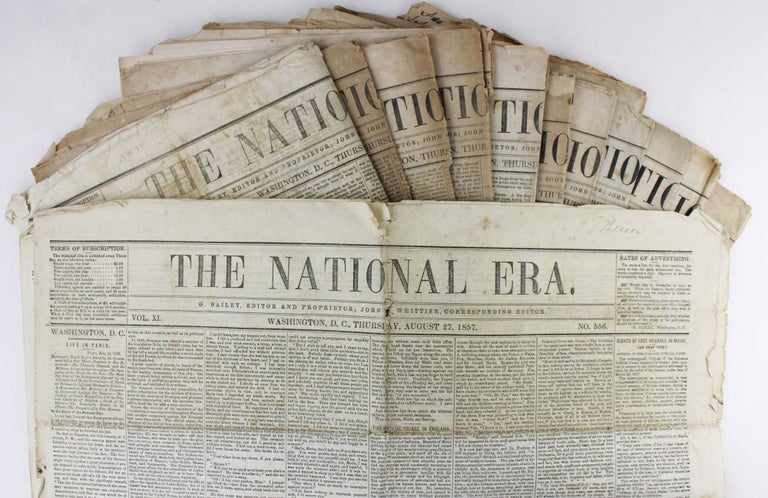
The National Era
Washington, D.C. Buell & Blanchard, 1848-1858. Twelve issues, each 4pp., printed in seven columns. Large folio. Old folds, varying levels of chipping, fold separations, foxing, and edge wear. Occasional minor loss of text from wear at crossfolds and in one case a tobacco burn. Some issues with ink notations at top left or in the top margin. Good. Item #3656
A dozen issues, published over the course of a decade in the mid-19th century, of the abolitionist newspaper The National Era, edited by Gamaliel Bailey and John Greenleaf Whittier. The National Era was an important source of news and debate over the issue of slavery during its thirteen-year run, and continuously argued for the abolition of the peculiar institution until it ceased operations in February 1860. The most lasting legacy of the newspaper is its serialization of Uncle Tom’s Cabin in forty-one weekly installments between June 1851 and April 1852, the first appearance of the novel anywhere. The present collection of issues includes number 81, 97, 144, 167, 329, 342, 371, 383, 384, 400, 556, and 589. The issues provide a cross-section of the concerns of the newspaper during the volatile years governed by the Fugitive Slave Law and just before the Civil War, and include speeches by John Dix, John Calhoun, Daniel Webster, Stephen Douglas, William Goodell, Thomas Hart Benton, Gerrit Smith, Eli Thayer, and numerous others. The passages concern a wide range of subjects important to abolitionists, such as "Free Soil in the West," "The Slavery Question," "The Legal Tenure of Slavery," "The Fugitive Slave Act - Proposition for Its Repeal," "Rights of Free Negroes in Maine. Can They Vote?," "Slavery in Oregon," "Kansas - Slavery - The Lecompton Constitution," and more.
There are also stories about the splitting of the Presbyterian Church in Alexander, Pennsylvania over the issue of slavery; a very long transcript of Congressional debate and other articles on "The Nebraska Bill," i.e., the Kansas-Nebraska Act which repealed the Missouri Compromise; numerous book excerpts and book reviews; news and machinations of the larger abolitionist movement; and so forth. One 1853 issue prints a story about a fugitive slave recovered in Kentucky named Tom Steel, noting he is "not the veritable 'Uncle Tom' of Mrs. Stowe notoriety." This illustrates the immediate popular thrust and wide dissemination of Stowe's great novel.
The prospectus for the newspaper, printed in 1847, stated its intentions: "While due attention will be paid to Current Events, Congressional Proceedings, General Politics and Literature, the great aim of the paper will be a complete discussion of the Question of Slavery, and an exhibition of the Duties of the Citizen in relation to it; especially will it explain and advocate the leading Principles and Measures of the Liberty Party, seeking to do this, not in the spirit of the Party, but in the love of Truth - not for the triumph of Party, but for the establishment of Truth.”
Issues of The National Era are rare in the market, especially in even small groups such as this one.
Price: $3,500.00
